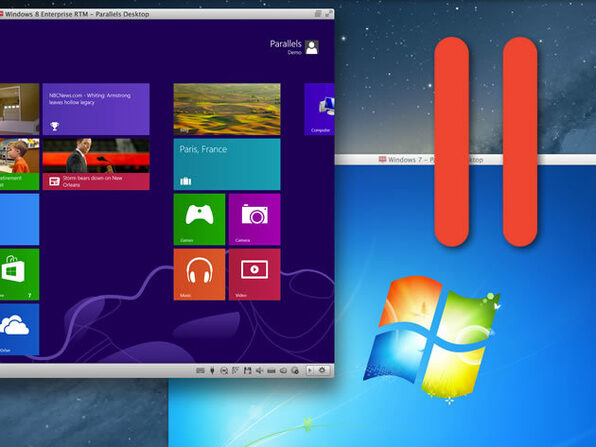- Parallels Desktop 8 For Mac Free Download
- Parallels Desktop Pro For Mac Student Edition
- Parallels Desktop 8 For Mac System Requirements
Whether you need more storage space on your Mac or want to uninstall Parallels from Mac, you will surely like this guide. Here, we share two different ways to remove Parallels safely from Mac.
Parallels Desktop for Mac, is a software providing hardware virtualization for Macintosh computers with Intel processors. It is developed by Parallels, since 2018 a subsidiary of Corel.
One is a manual method, and the other will be automatic.
For the automatic method, we will use the Uninstaller module provided by TuneUpMyMac.
What is TuneUpMyMac
- Parallels Desktop 8 for Mac is simply the #1 choice of customers to run Windows and Mac applications side-by-side, without rebooting. Powerful performance lets you run Windows productivity applications, even graphic intensive ones, with ease. Enjoy Lion and Mountain Lion features like Launchpad in Windows applications.
- Parallels desktop 14 for Mac is the fastest, easiest, and most powerful application for running Windows on Mac-without rebooting. Get up and running in minutes. Easily switch between Mac and Windows applications. Keep the look and feel of Mac OS or use the familiar Windows desktop.
As the name explains this software is the best Mac optimizer to tune your Mac. It intelligently and effectively clears unwanted data like – junk files, system cache, duplicates, old downloads, etc. All these files not only clutter Mac but also slows down system performance. Therefore, to keep your Mac optimized Systweak designed TuneUpMyMac. This tool not only does take care of unwanted stuff but also deletes sensitive stuff securely.
Anyone running macOS 10.7 and higher can use it easily without any training.
To know more about this fantastic mac cleaner, click here to read a detailed review.
Now that we know what is TuneUpMyMac and how it helps let’s learn how to uninstall Parallels Desktop on Mac.
Contents
Before that, what is Parallels?
What is Parallels?
Parallels Desktop for Mac is virtualization software that helps run different operating systems like Windows, Linux on Mac. This app makes integrating Windows into Mac easy. Once you have it, you can use Windows and Mac side by side.
But say if you would want to uninstall Parallels on Mac then? We’ve got it covered. Here we discuss how to delete Parallels on Mac.
Manual way to uninstall Parallels Desktop
Parallels Desktop from Mac can be uninstalled in several ways. Here we discuss the workable fixes.
There’s a possibility that some processes corresponding to Parallels might still be running in the background. Therefore, before deleting Parallels, we need to make sure processes related to Parallels are not running. For this, we will use Activity Monitor
Parallels Desktop 8 For Mac Free Download
To access it and kill all Parallel related tasks follow the steps below:

- Open Finder
- Click Finder bar > Go > Utilities
- Select Activity Monitor and double click it.
- Now look for the processes related to
- If you find any select them one by one and click Quit > Force Quit
- Now that you have closed all the running processes. Head to the Applications folder
- Look for Parallels > right-click > Move to Trash
- Empty it and restart Mac.
This is how you can uninstall Parallels.
Parallels Desktop Pro For Mac Student Edition
Additional Tip
Using the manual ways you cannot remove all related files. Therefore to remove all related files and free your Mac from app leftover clutter you need a tool that knows exactly where to look for these files. For this we suggest using Uninstaller module of TuneUpMyMac.
Manual Ways to Remove Parallels Desktop
Note: Before using any step, make sure Parallels Desktop is not running in the background. To close it go to Actions toolbar > Shut Down. Next click Parallels icon > Quit Parallels Desktop.
Parallels Desktop 8 For Mac System Requirements
- Open Finder and click the Go menu
- Select Go to Folder.
- Here, paste the following paths one by one and hit Go.
/Library/Library/LaunchAgents/Library/LaunchDaemons/Library/Application Support/Library/Preferences/Library/Cache
- Once the window for each path opens, look for items related to Parallels.
- Select them > right-click > Move to
Note: When removing files from the Library be cautious. If you are not sure about a file, don’t remove it as you might delete important files.
That’s it you have now completely uninstalled Parallels from your Mac.
Indeed, the manual way is a bit time consuming and lengthy. Therefore, to make things easy, we suggest using a dedicated tool that helps remove Parallels along with its traces.
Automatic Way to delete Parallels Desktop from Mac using TuneUpMyMac
I loved using TuneUpMyMac for this job. This mac cleaner is easy to use, and it offers several features.
Here’s how to use its Uninstaller tool:
1. Download and launch< TuneUpMyMac

2. Click Uninstaller module> Scan Now
3. Let the scan finish. Once done you will see Parallels Desktop
4. Select the Parallels Desktop.
5. Press the Uninstall button. That’s all!
In addition to this, to ensure no-cache or temporary files are left behind, consider using the System and Log Cleaner module along with One-click Cleaning. This will help remove all unwanted traces that take unnecessary space and slows down your Mac.
This is all, using these simple steps you can uninstall Parallels. Moreover, once you use TuneUpMyMac uninstaller app for Mac, you will be able to identify all the files that hog valuable disk space. Before deleting any items, the tool asks for confirmation. This helps keep a check on what things you are removing.
We hope you find our article helpful. Please mention your comments in the section
